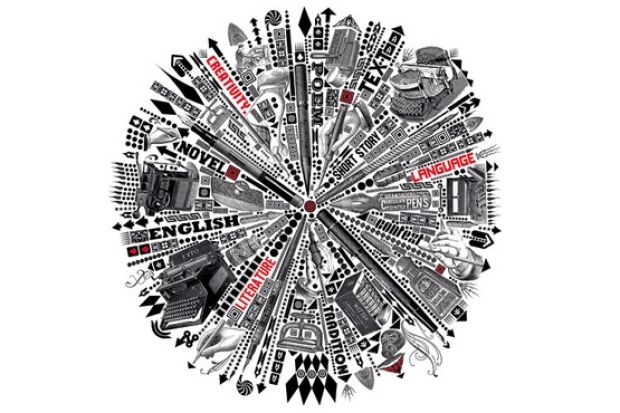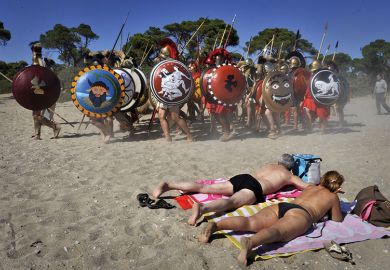Source: Lorenzo Petrantoni
Many teachers would not be willing to teach a course with any creative writing component and, secretly, quite possibly wish their creative writing colleagues would die horrible deaths
Until a few years ago, the study of “English” meant the study of texts by other people, usually dead (and therefore not able to answer back or otherwise complicate the experience of reading their work). Many students choosing to read English at university these days are interested not only in studying things written by dead people, or even things by brilliant people still living, but are also themselves driven by a desire to write - poems, short stories, novels or even, though this seems increasingly rare, plays. This selfish desire - let’s not pretend it is an altruistic or philanthropic urge - is nowadays catered for under the aegis of “creative writing”. In the UK and elsewhere in Europe, this is a fairly new state of affairs. But in the US, where “creative writing” has been on the scene for longer, many universities operate a policy of basic segregation: there is an “English” (or “literature”) department and a “creative writing” department, and the two lead separate existences, in a strange sort of academic isolation. However, things are changing. The relationship between “English” and “creative writing”, especially in the UK, is shifting.
It is true that many lecturers and professors are privately quite appalled by the rise of creative writing in universities. They believe, for very good reasons, that it is not compatible with the study of literary texts: works of literature demand rigorous critical attention, a strong understanding of the workings of the English language, a good grasp of historical context, an abiding respect and love for tradition (including a firm knowledge of literary genres), and an impartial aesthetic and intellectual curiosity about the great artistic accomplishments of others. Such teachers are often, indeed, sharply opposed to the idea that creative writing could be part of proper university study. They certainly would not be willing to teach a course with any creative writing component and, secretly, quite possibly wish their creative writing colleagues would die horrible deaths, with the senior management in their universities deciding not to advertise for replacements.
Creative writing may appear, in other words, to be quietly eating the heart out of English as a university subject. It is a contentious, in many ways divisive, aspect of literary studies. This is something that has, to date, been of little interest to the media, publishers or even (at least in a superficial way) students. Within the structure and functioning of English departments, however, it is a fraught and challenging topic. In the UK in particular, there has been a certain amount of movement in terms of accommodating this strange newcomer to the discipline of English - rather like accepting Heathcliff into the family, or agreeing that it is OK to have a vivarium of poisonous snakes in the bathroom. On the basis of the “if you can’t beat them, join them” argument, it is also possible to observe canny metamorphoses of erstwhile traditional courses - The Renaissance Lyric, for example, turning into Early Modern Poetry and Creative Writing.
In general, however, there has been unease and even antagonism on both sides: while many academics refuse to countenance the thought of actually teaching anything to do with creative writing, often those who do teach it feel a sense of inferiority and anti-academic aggression. In the past, creative writing tutors tended to be so-called “actual” or “real” writers, sometimes labelled “writers in residence”, who were not fully trained in the discipline of literary studies (hence the feeling of inferiority) and indeed not especially comfortable with the idea of being in or employed by a university (hence the aggression). A poet - no matter how wonderful her poetry might be - cannot expect to make a living merely from writing poems. Moreover, it is easy to suppose why, as a “real” writer, you might feel you should be scribbling impassioned things on scraps of paper (or an old laptop) while holed up in an anonymous cafe, or seeking isolation on a windswept beach or in gloomy woodland, not sitting in a classroom under fluorescent lighting in front of 20 egotistical know-nothings who expect you to be interested in what they write and how to make them write better.
Despite the speed and apparent smoothness with which creative writing has become incorporated into English departments, or (especially in the US) as a separate department alongside English, its institutionalisation is complex and deceptive. It is obvious, however, that its recent and remarkable expansion is closely bound up with the marketisation of higher education, especially in the US and the UK. Once you start thinking of “the student” as “the customer”, and once the customer’s own preferences are “prioritised” (to echo the business-speak that has come to prevail), it is inevitable that you should expect to see more courses in creative writing than in, say, medieval English prose or 18th-century pastoral verse.
And, of course, the rise of creative writing is not limited to universities: it is everywhere. An edition of The Guardian in October, for example, provided a special pull-out on “how to write a book [ie, a novel] in 30 days”. There is an air of madness about this. Everyone is being encouraged to pursue their talent for creative writing, often a talent they didn’t realise they had (and usually, in fact, don’t have). Anyone, supposedly, can be a budding writer. And if a serious newspaper such as The Guardian is to be believed, it need take you only a month from brazen start to blockbusting finish. The big question, however, has to be: who, if anyone, would read these novels? Or rather, perhaps: why is there no corresponding attention given to the concept of the budding reader? The future of literary studies crucially depends on the question of how well people can read. This is not just about how much knowledge or wisdom (cultural, social, historical and so on) can be gathered from reading literature but also about what kinds of thinking - perhaps new and revolutionary kinds - might be triggered by an encounter with a literary work. In this context I would suggest that we need to make space for “creative reading” as much as “creative writing” - at least if we understand “creative reading” to be something like “ways of reading that are not only rigorous, careful, attentive to historical context, different connotations and nuances of meaning and so on, but also inventive, surprising, willing to take risks, to be experimental, to deform and transform”.
For many people (both inside and outside the university), the current popularity of creative writing is perceived as symptomatic of a sort of self-reflexivity (masturbatory or incestuous, depending on inclination) that had been lurking in the depths of “literary studies” from the beginning. Thus the pursuit of creative writing as a respectable and accredited part of a degree in literary studies might appear to confirm what sceptics or detractors have long suspected, namely that English is a self-indulgent, vacuous discipline in which students can get grades for daydreaming on paper. People talk of the blossoming and burgeoning of creative writing: it is, as university management discourse has it, a “major growth area”.
This naturalistic language of organic metaphor, however, should be approached with some wariness. No one really talks of the viral spread, the contamination or contagious infection of creative writing within universities, but it might be worthwhile exploring the force and efficacy of such alternative images. “Growth”, after all, has a sort of duplicitous character, exemplifying what Freud called the “antithetical meaning of primal words”. The connotations are dark, destructive, cancerous, as much as light, fruitful, benign. “That’s a nice growth you have there”: is this a pleasant or disquieting remark?

There is an air of madness about this. Everyone is being encouraged to pursue their talent for creative writing, often a talent they didn’t realise they had (and usually, in fact, don’t have)
In important (if insufficiently acknow-ledged) respects, the recent expansion of creative writing testifies to a peculiar restoration of a conception of writing as personal self-expression. As scholar and consultant Robert Rowland Smith comments in On Modern Poetry: From Theory to Total Criticism (2012): “We’re at a point where more poetry is being written than published, let alone read, mainly because poetry has come to be considered so much as an outlet for personal feelings - the poem as the stylized mode of the journal entry. Even among poems that do get published - and there is a parallel with recent art - the emphasis on the recording of subjective experience is overwhelming.”
Creative writing courses feed into this, encouraging and accentuating an ambience of narcissism and self-centredness for fiction writers and poets alike. Novels may not be “recordings of subjective experience” in the same way as poems (although that tendency is certainly present and is closely related, in turn, to the recent emergence of what is called, by a curious sort of tautology, “life writing”), but the prevailing image and conception of novel-writing today is undoubtedly in the service of the culture of the self. It is all about you, as the piece in The Guardian makes clear from its opening words onwards: “Imagine you could write the first draft of a novel in only 30 days. Imagine you could figure out how long it would take to complete each step down to the day - that you could set realistic and accurate goals that would allow you to maintain a constant momentum.” It is all about you and your imagination, your ability to time-manage, your willingness to take and exercise control in a “realistic” way.
There is a quiet but deluded sort of triumphalism here that affects the media and the publishing industry, as well as the ethos of English in universities. And it is closely bound up with the perceived decline or demise of “theory”. No one need any longer have any fear of the “death of the author”, it would seem: that was just a fad 50 years ago. Leave all your worries about otherness - the unconscious, death, not to mention poverty and injustice, the environment, etc - behind. Come and join the world of self-affirming, self-expressive creative writing. In all of this it would be easy to concur with American literary critic Mark McGurl’s characterisation of the rise of creative writing. As he shows in The Program Era: Postwar Fiction and the Rise of Creative Writing (2009), writing has become overwhelmingly “the product of a system”.
Creative writing workshops and university courses in creative writing have come, however subtly and implicitly, to provide a base out of which contemporary literature (especially short fiction and the novel) operates. It is not just that university courses in creative writing encourage you to develop your own writing abilities and, very often, allow you to get in contact with literary agents and publishers. More particularly, the “program” (in McGurl’s phrase) involves making you feel like you are the special one, and it all comes down to the value and importance of what you have to offer - of your voice and your point of view. As McGurl observes, point of view becomes so fundamental, so all-determining, that even “the limitations of a given point of view are enabling”.
But this is only one way of construing the rise of creative writing. Another, equally compelling perhaps, would have to do with just those worries mentioned a moment ago, together with a more particular anxiety about the power and strangeness of fiction, poetry and drama in their capacity to disturb our well-established beliefs or presuppositions about the relations between truth and imagination, work and play, literature and real life. Any creative writing course worthy of the name should require its participants to reflect critically on what this thing is that they have signed up for. Why is it called “creative writing” rather than “literary practice” or “composition”? What does this word “creative” reveal or, perhaps, conceal about the business of sectioning off an activity within (or alongside) an English department? Just as the metaphor of “growth” has a double meaning, so “creative writing” might come to resonate in new and perhaps previously unheard of ways.
For example, “creative writing” can be easily and categorically distinguished from law or legal discourse, and yet language is the very element of law - every written law is in some sense a piece of creative writing; “creative writing” can be easily and categorically distinguished from history and historiography, and yet, as Jacques Derrida observed in Of Grammatology (1967), “writing opens the field of history” - all historical discourse is necessarily a trial or experiment in language, and might be described as, if nothing else, “creative with the truth”. “Creative writing” can also be easily and categorically distinguished from institutional and managerial discourse, and yet every institution is fundamentally made up, grounded on a performative fiction - as many academics still not entirely brain-deadened by it may attest, “managerial speak” is full of dreary, sleep-inducing, inane, vacuous, ungrammatical, repetitious, circumlocutory, jargonistic, euphemistic, pleonastic idiocies of the first order, but it also depends in crucial ways on imaginative or “creative” deformations of language (for example, terms such as “performance”, “excellence” or, of course, “growth”).
The Chambers Dictionary’s definition of “creative” gives, in the first instance, “having power to create; creating; showing or relating to imagination or originality”; but it goes on to suggest a less benign, more mischievous sense of the word: “creative”, “(especially of accounting or accountancy) characterized by an imaginative re-interpretation or dubious manipulation of established rules of procedure”. The growth of creative writing has duplicitous power, connected with the other seismic shifts currently going on in literary studies. For the “creative”, as I have been sketching it here, cannot in fact be held rigidly separable from “critical writing”. A certain kind of institutional apartheid might remain in force for some years to come, but the mixing and meddling of creative and critical writing has been going on for some time. Indeed, this might be described as one of the principal legacies of “theory”: that the critic or theorist is no longer simply a deliverer of information, knowledge or philosophical speculation but a producer of texts that - just as much as any novel, play, poem or short story - bear the singular and inventive mark of their author. The critic or theorist does not simply describe or analyse but brings something new, something of their own, to the text under consideration.
What so-called “theorists” such as Roland Barthes, Maurice Blanchot, Hélène Cixous, Derrida and Jacques Lacan all have in common is a commitment to questioning, experimenting and tampering with language. Above all, their texts interfere with any straightforward distinctions between creative and critical writing. The sort of old-fashioned senses of inferiority and anti-academicism noted earlier are giving way to more intricate and interesting effects. The traumatic impact of “theory” is continuing to register in the discipline of English. “Creative and critical writing” (as taught at an increasing number of institutions, including the universities of Sussex and East Anglia) is one of the names for this. Increasingly, those who used to teach and write critical or theoretical texts are writing fiction, poetry and so on; and kinds of text are being produced that call for budding readers rather different from those who studied literature in the past.
Register to continue
Why register?
- Registration is free and only takes a moment
- Once registered, you can read 3 articles a month
- Sign up for our newsletter
Subscribe
Or subscribe for unlimited access to:
- Unlimited access to news, views, insights & reviews
- Digital editions
- Digital access to THE’s university and college rankings analysis
Already registered or a current subscriber? Login




